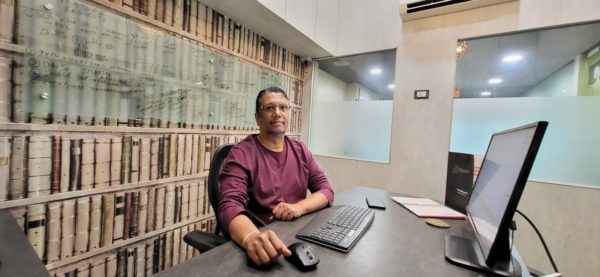Indrajit Ghosh | Global Chairman | MSMECCII –
This November, the MSME Chamber of Commerce and Industry of India (MSMECCII) will host the 5th Global Sustainability Summit 2024, spotlighting sustainability across various sectors. Indrajit Ghosh, the Global Chairman of MSMECCII, explained the significance of this summit, stating, “For the first time, both in India and on the global stage, we will address 25 sectors with a focus on sustainability. These sectors range from recycling and waste-to-wealth initiatives to zero waste and US recycling technologies. We will also explore the EPA and circular economy, green energy solutions—such as solar recycling, green hydrogen, biofuels, biogas, ELG, CSR, and carbon neutrality—along with electric vehicles, mobility, and battery recycling. Additionally, the summit will examine refurbishing and OEM contributions, as well as innovations in startups, venture capital funding, and banking. Key sectors like handicrafts, jute, leather, textiles, garments, home furnishings, food processing, and a CEO roundtable will also be highlighted.”
This ambitious agenda reflects the need for a concerted effort toward sustainability at a global level, particularly in sectors critical to India’s economy. The Global Sustainability Summit will emphasize the importance of adopting eco-friendly practices, not only to meet global environmental goals but also to improve efficiency and innovation within businesses, especially MSMEs.
Empowering MSMEs with Green Technology
The integration of green technology is crucial for Micro, Small, and Medium Enterprises (MSMEs) as it not only enhances operational efficiency but also fosters a sustainable business model that aligns with global environmental goals. MSMEs, which form the backbone of India’s economy, have the potential to significantly reduce their environmental impact by adopting such practices. Mr. Ghosh elaborated on the importance of this transition, saying, “Green technology offers MSMEs the ability to reduce waste, lower energy consumption, and minimize their carbon footprint, which ultimately leads to cost savings and improved competitiveness in the market.”
By embracing green technology, MSMEs can position themselves to meet the growing consumer demand for sustainable products and services, opening up new avenues for growth and innovation. Green technologies like solar recycling, biofuels, and biogas production are not just environmentally beneficial but are also economically viable, offering long-term returns in terms of cost savings and operational efficiency. MSMEs, which play a significant role in the economy, stand at a crucial juncture where adopting these technologies can fuel their growth and enhance their resilience in the face of climate change.
Generational Differences in Adopting Green Technologies
However, despite the benefits, Mr. Ghosh pointed out that the adoption of green technologies by MSMEs has been somewhat slow, primarily due to certain challenges. He explained, “One major obstacle is the prevailing mindset. Many of these small enterprises, often with a workforce of around 10 people, find it difficult to adjust to the new standards of business. It’s not that they are unwilling, but rather that they are struggling to keep pace with the changes.”
This challenge is compounded by generational differences in how businesses approach sustainability. Mr. Ghosh noted, “We do see a difference in generational attitudes. The younger generation is adapting quickly, while the older generation is taking more time to embrace these innovations.” The younger generation, often more aware of the environmental consequences of traditional business practices, is leading the charge toward greener methods, while the older generation may be more resistant to change due to a reliance on tried-and-true processes.
Despite these challenges, MSMECCII and other chambers of commerce are actively supporting businesses in this transition, offering guidance, resources, and incentives to adopt greener practices. As Mr. Ghosh highlighted, “The summit will also give people an opportunity for networking,” allowing businesses to learn from one another and collaborate on innovative solutions.
Challenges Facing MSMEs: Supply Chain and Funding
Even with growing awareness and support, MSMEs continue to face significant hurdles that prevent them from fully embracing sustainability. According to Mr. Ghosh, the two main challenges are funding and supply chain management. He explained, “First, there’s the supply chain issue. MSMEs often source materials from distant regions, and this leads to higher costs due to transportation and the need for bulk bookings. If they’re unable to procure materials locally, the costs escalate, especially when there is high demand or logistical overloads.”
Transportation costs and logistical challenges disproportionately affect smaller businesses, which may not have the resources to absorb such costs without impacting their bottom line. In addition, supply chain disruptions, which have become more frequent due to global events, further exacerbate the issue for MSMEs that rely on timely delivery of raw materials.
Mr. Ghosh also pointed out the challenge of funding, which continues to be a major barrier for MSMEs. “Second, there’s the challenge of funding. While the government has introduced various facilities, such as grants and loans, to support MSMEs, many still struggle with access to capital. Larger companies are stepping in to help, with some even taking responsibility for assisting smaller start-ups, offering them financial aid and management support.” Despite government efforts, many MSMEs find it difficult to navigate the complexities of securing loans or grants, and the lack of consistent access to capital hampers their ability to invest in sustainable technologies and practices.
Collaboration and Support for MSMEs
In an effort to address these challenges, MSMECCII has forged partnerships with organisations that can provide the necessary support to MSMEs. For example, the NGO has collaborated with Boston Soliver, a California-based company with over 60 years of experience. As Mr. Ghosh explained, “They are doing the certification of process engineering, digital marketing, and sustainability. So we have taken a pledge to make the MSME industries 100% world-class. So the manufacturing unit should be world-class.” This collaboration aims to provide MSMEs with the expertise and resources needed to improve their manufacturing processes, meet global standards, and enhance their competitiveness.
The Dual Quality Standards Issue
A key issue that needs to be addressed, according to Mr. Ghosh, is the existence of two quality standards—one for the domestic market and another for export. He explained, “This duality not only complicates production but also inflates inventory costs, as businesses are forced to maintain separate stocks for each market. If we produce a single, world-class product for both domestic and export markets, inventory management becomes more efficient. Companies can respond more swiftly to export clients while meeting domestic demand without unnecessary delays.”
The current system of maintaining two quality tiers is not only inefficient but also costly. Businesses are forced to juggle different sets of standards, which can slow down production and lead to delays in fulfilling orders. Moreover, this dual system raises a fundamental question: Why should Indian consumers be deprived of the highest quality products, such as the best tea, sugar, and rice, which are often reserved for export markets? By producing a single, world-class product for both markets, Indian businesses can improve their operations, reduce costs, and enhance the global and domestic perception of Indian goods.
Sustainability and the Future of MSMEs
Nearly every industry faces significant challenges related to pollution and climate change, and MSMEs are no exception. Historically, these issues have been difficult to address, with limited measures in place to control environmental damage. However, Mr. Ghosh emphasised that there has been a noticeable shift in recent years, driven by stricter government regulations. “Today, before a company can begin operations, it must meet rigorous environmental standards, and if its activities contribute to pollution, it is not permitted to proceed,” he explained.
This represents a significant change in how industries, including MSMEs, operate. The government’s focus on environmental accountability is pushing businesses to adopt more sustainable practices, and the momentum toward greener operations is growing. “While the process of change will be gradual—given the country’s population of 1.35 billion and the vast number of factories—the encouraging news is that the system is finally evolving,” Mr. Ghosh said.
For the first time, there is a concerted effort to hold industries accountable for their environmental impact, and this marks a pivotal moment in addressing long-standing environmental concerns. As the summit will showcase, with the right policies in place, the path toward a more sustainable future for MSMEs and Indian industries is becoming clearer.
The 5th Global Sustainability Summit 2024 promises to be a platform for MSMEs, industry leaders, and stakeholders to collaborate, share knowledge, and build a sustainable future together. Through this collective effort, India’s MSMEs can emerge as global leaders in sustainability and innovation.
By Tanisha Saxena













